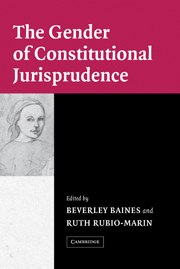Book contents
- Frontmatter
- Contents
- List of Contributors
- Acknowledgments
- The Gender of Constitutional Jurisprudence
- Introduction: Toward a Feminist Constitutional Agenda
- 1 Speaking into a Silence: Embedded Constitutionalism, the Australian Constitution, and the Rights of Women
- 2 Using the Canadian Charter of Rights and Freedoms to Constitute Women
- 3 Emancipatory Equality: Gender Jurisprudence under the Colombian Constitution
- 4 Gender Equality and International Human Rights in Costa Rican Constitutional Jurisprudence
- 5 Constituting Women: The French Ways
- 6 Gender in the German Constitution
- 7 India, Sex Equality, and Constitutional Law
- 8 Constitutional Transformation, Gender Equality, and Religious/National Conflict in Israel: Tentative Progress through the Obstacle Course
- 9 “No Nation Can Be Free When One Half of It Is Enslaved”: Constitutional Equality for Women in South Africa
- 10 Engendering the Constitution: The Spanish Experience
- 11 Gender Equality from a Constitutional Perspective: The Case of Turkey
- 12 Gender and the United States Constitution: Equal Protection, Privacy, and Federalism
- Index
- References
5 - Constituting Women: The French Ways
Published online by Cambridge University Press: 14 January 2010
- Frontmatter
- Contents
- List of Contributors
- Acknowledgments
- The Gender of Constitutional Jurisprudence
- Introduction: Toward a Feminist Constitutional Agenda
- 1 Speaking into a Silence: Embedded Constitutionalism, the Australian Constitution, and the Rights of Women
- 2 Using the Canadian Charter of Rights and Freedoms to Constitute Women
- 3 Emancipatory Equality: Gender Jurisprudence under the Colombian Constitution
- 4 Gender Equality and International Human Rights in Costa Rican Constitutional Jurisprudence
- 5 Constituting Women: The French Ways
- 6 Gender in the German Constitution
- 7 India, Sex Equality, and Constitutional Law
- 8 Constitutional Transformation, Gender Equality, and Religious/National Conflict in Israel: Tentative Progress through the Obstacle Course
- 9 “No Nation Can Be Free When One Half of It Is Enslaved”: Constitutional Equality for Women in South Africa
- 10 Engendering the Constitution: The Spanish Experience
- 11 Gender Equality from a Constitutional Perspective: The Case of Turkey
- 12 Gender and the United States Constitution: Equal Protection, Privacy, and Federalism
- Index
- References
Summary
The French situation might appear to be a paradox when studying women in constitutional law. On the one hand, the Constitution of 1958, as amended, has not fundamentally altered women's constitutional status. The prevailing principle of republican universalism, conceived during the French Revolution in 1789, remains the key notion in the constitutional debate and the inspiration of all legal provisions. On the other hand, a recent constitutional reform vested parliament with the power to organize a “parity” or strict gender equality, democracy. This power resulted in the enactment of a statute requiring that, under certain conditions, an equal number of male and female candidates must appear on the lists submitted to voters for most elections. From this point of view, the French experience could appear a very innovative one.
France has a civil law system, with a clear separation between civil and administrative law (the former is codified for most issues, the latter is closer to case law) and separate adjudicative bodies (namely, the Cour de cassation [civil] and the Conseil d'Etat [administrative]). Insofar as most matters pertaining to women's legal status are governed by written texts (the Constitution, regular statutes, and sometimes administrative rules), adjudicative bodies are generally limited to applying those texts to concrete cases without creating new law.
The current Constitution is known as the Constitution of the Vth Republic. Adopted in 1958, it established a system of government that is sometimes characterized as a “presidential” system and sometimes as a “unique parliamentary system.”
- Type
- Chapter
- Information
- The Gender of Constitutional Jurisprudence , pp. 122 - 148Publisher: Cambridge University PressPrint publication year: 2004



